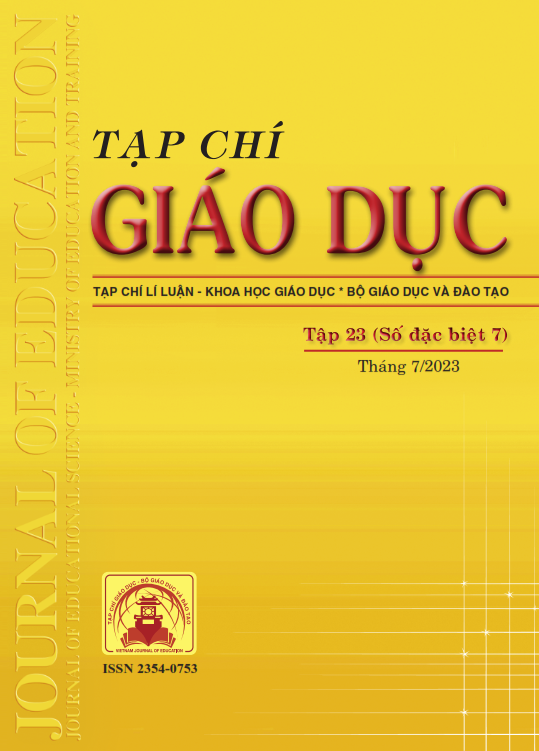Xây dựng bộ dụng cụ thí nghiệm lượng nhỏ hỗ trợ dạy học chủ đề “Acid - Base - Oxide - Muối” trong môn Khoa học tự nhiên lớp 8
Tóm tắt
Using experiments in teaching plays an important role in developing students' skills and is emphasized in the 2018 General Education Program. However, our teachers still face difficulties in organizing teaching activities using experiments. Microscale experiment test kits with safe, effective and environmentally friendly experiments can help solve this problem. The research paper aims to develop a microscale experiment kit to support teaching the theme “Acid - Base - Oxide - Salt” in Grade 8 Natural Science. The integration of microscale experiments provides an effective and sustainable approach, providing students with an engaging learning experience while minimizing the impact on the environment.
Tài liệu tham khảo
Bộ GD-ĐT (2018). Chương trình giáo dục phổ thông - Chương trình tổng thể (ban hành kèm theo Thông tư số 32/2018/TT-BGDĐT ngày 26/12/2018 của Bộ trưởng Bộ GD-ĐT).
Bradley, J. D. (2019). Small-scale chemistry. Chemistry International, 24(3).http://www.iupac.org/publications/ci/2002/2403/smallscalechemistry.html
Dewey, J. (1933). How we think: A restatement of the relation of reflective thinking to the educative process. Lexington, MA: D.C Heath and Company.
Mafumiko, F., Voogt, J., & Van den Akker, J. (2013). Design and Evaluation of Micro-Scale Chemistry Experimentation in Tanzanian Schools. Educational design research-Part B: Illustrative cases, 581-600.
Newmann, F. M., & Marks, H. M. (1996). Authentic pedagogy and student performance. American Journal of Education, 104(4), 280-312.
Phạm Thị Bình, Đỗ Thị Quỳnh Mai, Hà Thị Thoan (2016). Xây dựng bài tập hóa học nhằm phát triển năng lực thực hành hóa học cho học sinh ở trường phổ thông. Tạp chí Khoa học, Trường Đại học Sư phạm Hà Nội, 6A, 72-78.
Roselle, D. U,. Herbert, M. D., Ponciano M. D., (2022). Measuring Students' Learning and Attitude as Exposed to Microscale Laboratory Experiments in Inorganic Chemistry. International Journal of Education, Teaching, and Social Science, 2(2), 132-141.
Sattsangi, P. D. (2010). A Microscale Approach to Chemical Kinetics in the General Chemistry Laboratory: The Potassium Iodide Hydrogen Peroxide Iodine-Clock Reaction. Journal of Chemical Education, 88(2), 184-188.
Singh, M. M., Szafran, Z., & Pike, R. M. (1999). Microscale Chemistry and Green Chemistry: Complementary Pedagogies. Journal of Chemical Education, 76(12), 1684.
Tallmadge, W., Homan, M., Ruth, C. and Bilek, G. (2019). A local pollution prevention group collaborates with a high school intermediate unit bringing the benefits of microscale chemistry to high school chemistry labs in the Lake Erie watershed. Chemical Health & Safety. July/August.
Tesfamariam, G. M., Lykknes, A., & Kvittingen, L. (2017). Named Small but Doing Great: An Investigation of Small-Scale Chemistry Experimentation for Effective Undergraduate Practical Work. International Journal of Science and Mathematics Education, 15(3), 393-410.
Tesfamariam, G., Lykknes, A., & Kvittingen, L. (2014). Small-Scale Chemistry for a Hands-on Approach to Chemistry Practical Work in Secondary Schools: Experiences From Ethiopia. African Journal of Chemical Education, 4(3), 48-94.
Thái Hoài Minh, Đinh Thị Xuân Thảo (2021). Design teaching activities using small experiments in Chemistry at high school. HNUE Journal of Science, 66, 171-181.
Ural, E. (2016). The Effect of Guided-Inquiry Laboratory Experiments on Science Education Students’ Chemistry Laboratory Attitudes, Anxiety and Achievement. Journal of Education and Training Studies, 4(4), 217-227.
Williams, C., & Aderonmu, T. (2015). Towards an enhanced performance in physics practicals: the microscience kits experience. International Journal of Education and Research, 3(4), 29-40.
Đã Xuất bản
Cách trích dẫn
Số
Chuyên mục
Giấy phép

Tác phẩm này được cấp phép theo Ghi nhận tác giả của Creative Commons Giấy phép quốc tế 4.0 .












